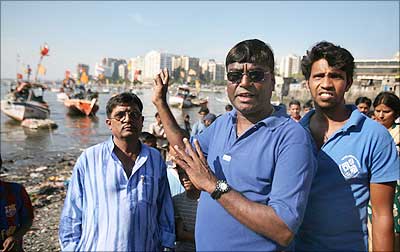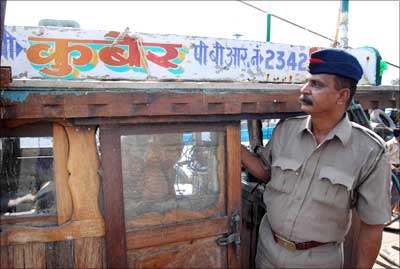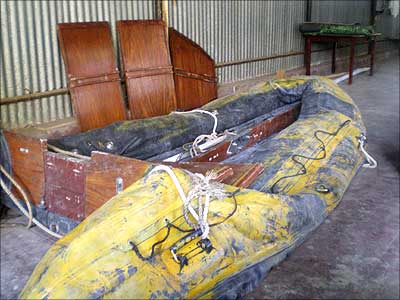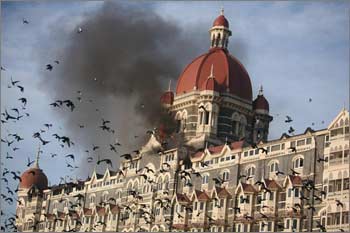Photographs: Rediff Archives
It took Bharat Tamore six long, unpleasant months to be able to get even a night of unbroken sleep after 26/11.
"He would be tossing and turning all night. He has diabetes and blood pressure and he was in bad shape," recalls his wife Savita.
Unease, fear, his narrow escape and a strange remorse relentlessly dogged him. "I constantly think of how I only just barely escaped (he makes a gesture of reverence to god with his hand over his face indicating his unbelievable luck) But it bothers me that I could not do anything. Although I did have the daring to ask them who they were!"
Add to that the enormity of the responsibility of having to give an accurate testimony to the police and in court and Tamore's life had turned upside down.
"There is a little Hanuman temple near my home. Every day when I passed it I would pray that god would give me the strength to see this through properly. That I would give the right information in court. And do the whole thing correctly. It was an attack on my home/my livelihood/my country. I had to testify."
Tamore lives in a spotlessly clean, three-room home in Machhimar Colony, opposite Badhwar Park, south Mumbai -- of Koli background, he has been living there since 1976 when he came up from his village near Palghar, close to the coast, north of Mumbai in Thane district.
He works as an assistant supervisor in the steward's department at the Taj Mahal Palace and Tower, located just a kilometre from his home.
Every evening Tamore dons a crisp white Nehru jacket and black pants in the staff locker room in the rear bowels at the Taj and begins his 10 pm duty in the hotel's sumptuous banquet rooms, ensuring that tables, chairs, cutlery, crockery and the room layout is in order for forthcoming events.
When Tamore reached his locker and changed at about 9.30 pm on November 26, he heard some strange thumping overhead in the hotel's coffee shop, the Shamiana. Surprisingly, it continued. And got louder and stranger in sound. Then hordes of terrified employees, on the run, came pouring back into the staff area, where Tamore still was, and shared breathless descriptions of the ongoing attack and the terrorists.
"They recounted that they were wearing jeans, and 'sack bags' (rucksacks) on their backs and carrying bags in their hands "
Suddenly with cold foreboding Tamore knew exactly who they were.
'There were 10 men between the ages of 22 and 25'
Image: The Kuber, the boat used by the terrorists.Photographs: Rediff Archives
It was the night of the gripping India versus England one-day match in Cuttack(India was winning so everyone in the area was watching the game) and the little chowk (clearing), which is usually packed with Koli folk chatting, gossiping, fixing fishing nets, lolling near their berthed boats and having a general daily airing, was completely deserted.
What made Tamore stop in his tracks was a strange sight. In front of him pulling out of the water was a motorised dinghy.
"It was 9 or 9.15 pm. In a rubber dinghy there were 10 men between the ages of 22 and 25. They were all wearing orange life vests over jeans and T-shirts. Eight of them got off and took off their life vests and left them in the boat. They were carrying both sack bags and hand bags. The knapsacks were so heavy that each one was helping the other put it on his back. They came up to the road in pairs."
Tamore was transfixed because he had never seen anything like this before in all his years of living at the Machhimar Colony. Sure Bombay harbour had its quota of fancy boats and dinghies, but none of them ever found their way into this little quay that is reserved for fishing vessels.
"And you see people getting into a boat with heavy bags. You don't see them coming off with heavy bags. They used to be smuggling around here, but that stopped years ago."
'We are students and what business is it to you?'
Image: The rubber dinghy the terrorists used to get ashore.Photographs: Vaihayasi Pande Daniel
"The dinghy had still two people in it. And they pulled the rassi (starter string of the outboard motor) and started up the dinghy -- it was a quiet sound like the motor of a car -- and sailed in the direction of the Oberoi and I proceeded to work."
But Tamore had no time to ponder over the shock of realising that he had had an earlier encounter with the terrorists because events were moving fast within the Taj that night.
The noises were getting louder and more ominous from above and petrified guests and staff were being herded from one area to another below.
"They herded about 100, 150 of us into an area near the bakery and told us to stay here. At the time we thought it was a temporary attack and we would get out after it was over. Who knew they would be there for three days?!"
Tamore and the others were fearfully huddled there for interminable hours wondering what would happen to them. "We had no water, no food. And no way of telling people at home that we were still safe. We had all turned our phones off."
At 3.30 am, their group, by some miracle, were rescued, he thinks, by the commandos and sent out from the back gate home. His wife -- who had been watching the awful events on television, with her heart in her mouth, all night -- and all the neighbours came rushing out, crying and sobbing to meet him.
The Taj had been his life for 18 years and it did survive
Image: Pigeons fly near the burning Taj Mahal hotel.Photographs: Reuters
"It was on fire. I was so upset. These terrorists had attacked my roti-rozgar (livelihood) and also come by my house. It was just terrible."
The Taj had been his life for the last 18 years and it had made him what he was, brought him prosperity "Humara zindagi tha (It was my life)." He was fearful that it would soon be all over.
But the Taj did survive to Tamore's joy. With reverence he says, "Woh achche Parsi log ne 20 din ke andar Taj ko wapas khol diya. Mr Ratan Tata ne hum logo ko salary bhi diya." (The good Parsis reopened it in 20 days. Taj Chairman Ratan Tata also gave us our salaries).
Much of early 2009 was marked by recording his testimony, working with the Mumbai police's crime branch to have his deposition ready.Tamore has a meticulous, upright but carefully thoughtful manner of speaking that probably lent strength to his deposition.
He even had to make trips to the morgue where he was able to identify one of the terrorists. But he does not want to talk about it because that was one of the most haunting moments of the whole nightmare. He made his deposition in court in May.
It has been a stiff struggle to slowly ease the fear of these horrifying events out of his mind, his dreams, although perhaps not his soul. It will always be, he says, the worst day of his life. Workshops were held at the hotel to help employees get over the tragedy and get a grip.
For Bharat Tamore it will always be a shock how he so perilously escaped death twice on one evening. "Luckily there was a cricket match and no one was around (at Machhimar Colony) or they would have mowed us all down. I cannot even think about that."





article